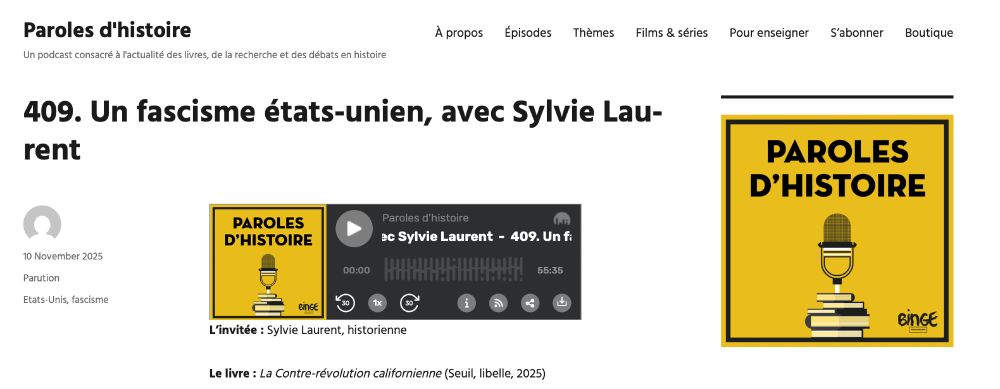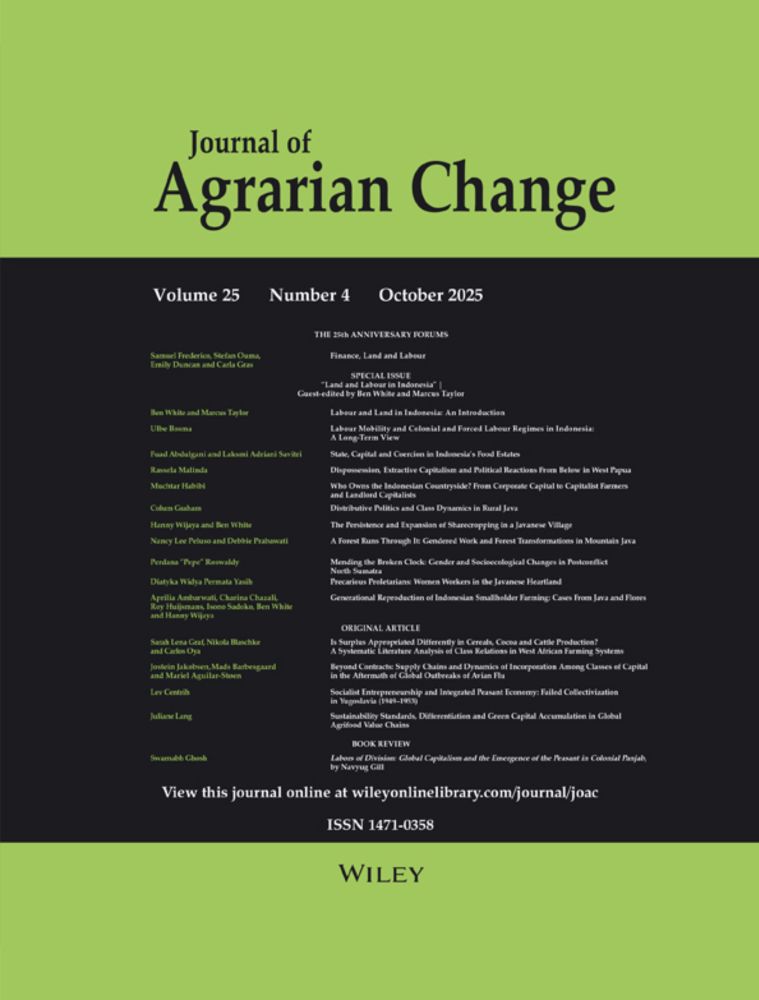
parolesdhistoire.fr/index.php/20...
Au-delà du "ricanement démocratique", comprendre le fascisme en train de se faire.
@andreloez.bsky.social
@nbrisset.bsky.social
I teach and research the history of economics and the history of social sciences. https://sites.google.com/d/1kByt4pZDAWI2SNUeW0fwVkvr1gWIoi2Y/p/1Ux-p6ofLnKK5qkhYvMbY8XNhbZ6nU30h/edit

parolesdhistoire.fr/index.php/20...
Au-delà du "ricanement démocratique", comprendre le fascisme en train de se faire.
@andreloez.bsky.social

Peut-on justifier un revenu inconditionnel par le fait que la terre soit la propriété commune du genre humain, selon l'argument de Paine, Spence, Van Parijs, etc. ?
Dans un article qui vient d'être publié (REP, 2025) je demande : Egalité de quel élément de la propriété, l'usus ou le fructus ?
🧵🏄🥥
Je pense que tout le monde devrait écouter cette prise de parole et mesurer ce qui vient de se produire avec cette tentative d'annulation, validée en haut lieu, d'un colloque scientifique au Collège de France
13.11.2025 15:52 — 👍 591 🔁 406 💬 10 📌 15There are indeed two distinct concepts: the return to periods of “finite capitalism” that would have the same characteristics, and the question of mechanisms (and therefore cyclicality).
13.11.2025 12:59 — 👍 1 🔁 0 💬 1 📌 0C’est la situation de la fin du XIXe siècle et celle des années 2020” (pp. 83-84).
13.11.2025 12:59 — 👍 1 🔁 0 💬 1 📌 0Soit un hégémone naval existe, mais la croissance manufacturière d’autres nations est telle qu’elle conduit, en vertu des lois de Mahan, à ce que la progression de leur système maritime dual (civil et militaire) finisse par contester cet hegemone....
13.11.2025 12:59 — 👍 1 🔁 0 💬 1 📌 0“Il n’y a que deux grandes possibilités. Soit il n’y a pas d’hégémone naval, et la poussée de la marine marchande d’une nation nécessite son propre système de protection (c’est le cas de départ, XVIe–XVIIIe siècle, le plus simple)....
13.11.2025 12:59 — 👍 1 🔁 0 💬 1 📌 0That is indeed debatable. For my part, I read the report in Mahan's book as a search for a basis for the dynamic between trade and armament. For example, in this kind of passage:
13.11.2025 12:59 — 👍 1 🔁 0 💬 1 📌 0That may indeed be a bit strong.
13.11.2025 11:35 — 👍 1 🔁 0 💬 1 📌 0Totally connected to my point, I couldn't agree with you more.
13.11.2025 06:52 — 👍 0 🔁 0 💬 0 📌 0The parallel with KXXI is really very good, and I think the book suffers from the same problem: a great deal of superficiality in its theoretical and historical framework.
shs.cairn.info/revue-de-phi...
...However, it is this long-term view based on a loose definition of capitalism that supports the thesis of cyclicality.
13.11.2025 06:50 — 👍 0 🔁 0 💬 1 📌 0That is precisely the point of my note: by not defining capitalism, Arnaud is led to view capitalism in periods for which it seems anachronistic to me to speak of capitalism (there is much debate on these issues)...
13.11.2025 06:50 — 👍 0 🔁 0 💬 1 📌 0
Œconomia launches a new type of publication: Data & Quantitative Methods in the History/Philosophy of Economics
The goal: give space to reflections often sidelined in traditional articles where transparency & discussion of methods get cut for “results.”
journals.openedition.org/oeconomia/19...

Pour ceux qui ne l'auraient pas encore vu, cet hommage IA de l'ancienne ministre des Anciens combattants, avec deux Bretagne, plus de Marseille, Madrid française. Et un magnifique casque type Stahlhelm 1935 pour honorer la mémoire des poilus...
11.11.2025 20:05 — 👍 134 🔁 49 💬 11 📌 922/ Its limits perhaps stem from Orain’s determination to see today’s capitalism, at all costs, as a resurgence of earlier dynamics. But that very risk is what makes for a genuinely rich and productive historiographical debate.
👉https://h-france.net/vol25reviews/vol25no67Brisset.pdf
21/ Beyond its thesis, Le monde confisqué prompts a deeper question: what use are theoretical definitions when writing history—and how can historical reasoning still help us read the present?
11.11.2025 09:39 — 👍 1 🔁 0 💬 1 📌 020/ After all, the idea that capitalism is less about economic liberalism than about the struggle for monopolization—and that the state’s role is not to guarantee “free trade” but to defend the interests of big capital—is hardly new.
11.11.2025 09:39 — 👍 2 🔁 0 💬 1 📌 0
19/ Seen differently, Orain’s “capitalism of finitude” overlaps with older theories of monopoly and imperialism—from Hilferding and Luxemburg to Braudel. But he rarely situates himself within that lineage, leaving ambiguities.
11.11.2025 09:39 — 👍 1 🔁 0 💬 1 📌 018/ This matters: if the Dutch Republic wasn’t capitalist, Orain’s cyclical narrative (capitalism swinging between liberalism and finitude) may rest on shaky ground. The “cycle” could be an illusion.
11.11.2025 09:39 — 👍 3 🔁 0 💬 2 📌 017/ This is a crucial debate, since the Dutch Republic often appears as a borderline case. From Braudel and Bairoch to De Vries and Brenner, historians have long debated whether its commercial dynamism was truly capitalist—and the discussion continues today.
www.histoire-radicale.fr/2025/04/09/a...

16/ Dutch merchants drew power from political privilege, not productive investment. That’s why, for Meiksins Wood, the Dutch economy was pre-capitalist—and why England, with capitalist property relations, ultimately prevailed.
11.11.2025 09:39 — 👍 2 🔁 0 💬 1 📌 0
15/ For Meiksins Wood, capitalism isn’t wherever commerce or profit exists. It requires a specific social property regime: private ownership combined with the market dependence of producers—conditions absent in the Dutch case.
onlinelibrary.wiley.com/doi/abs/10.1...

14/ One example is the Dutch Republic. For Orain, it exemplifies early capitalist finitude: a maritime empire built on commerce and monopolies. An alternative interpretation, developed by Ellen Meiksins Wood, holds that the Dutch Republic did not possess a genuinely capitalist organization.
11.11.2025 09:39 — 👍 3 🔁 0 💬 1 📌 0

13/ By centering on rents and monopolies, Orain sidelines key dynamics: capital accumulation, class and property relations, social production, etc.
11.11.2025 09:39 — 👍 1 🔁 0 💬 1 📌 0
12/ From the classic Dobb–Sweezy exchange on the origins of capitalism to the later Brenner Debate on agrarian class structures, these controversies have shaped how we understand both what capitalism is and how it changes.
11.11.2025 09:39 — 👍 1 🔁 0 💬 1 📌 0
11/ This stance may seem somewhat quick to set aside a long and complex historiographical tradition, in which questions of definition and questions of dynamics have always been deeply intertwined.
11.11.2025 09:39 — 👍 1 🔁 0 💬 1 📌 010/ But there’s a tension. In his introduction, Orain writes that historiographical debates about capitalism are “of little interest”. Yet the book itself advances a clear definition: capitalism as appropriation and rent extraction rather than accumulation and production.
11.11.2025 09:39 — 👍 3 🔁 0 💬 1 📌 0
9/ This makes the book stimulating: it uses history—maritime law, colonial charters, industrial cartels—to diagnose today’s transformations: digital monopolies, industrial policy, imperial rivalry.
11.11.2025 09:39 — 👍 1 🔁 0 💬 1 📌 08/ Territorial control, strategic dependency, and even military protection re-emerge as core logics of capitalism.
11.11.2025 09:39 — 👍 2 🔁 0 💬 1 📌 0